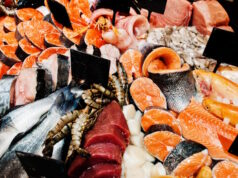
Provenance and sustainability are the trending buzzwords in a new wave of eco-friendly vodka and spirits, which means more and more beverage brands are choosing to emphasize the origin of their ingredients over premium brand status.
Instead of focusing on flashy flavors, today’s small distilleries highlight sustainable spirits sourced from specific regions.
For example, sustainably made vodka is seeing a meteoric rise in popularity and is widely regarded as the future of the vodka industry.
According to SevenFifty Daily, a journal covering business and culture in the alcohol sector, there were less than 400 artisan vodka labels in American stores in 2010 — today, there are over 1,500.
Eco-friendly vodka from Ireland’s Boatyard Distillery hails from Irish wheat grown on a handful of farms in County Kildare. The flavor of X Muse vodka results from two heritage varieties of Scottish barley. Finally, at the crest of this wave in the US is Tina’s Planet Vodka, made from organic, non-GMO corn grown in the United States.
Tina’s Vodka went an extra step and filters the vodka through organic renewable coconut shells to give the vodka a different mouthfeel and a purity you can taste and feel which makes it stand out amongst the other vodkas.
This new trend in sustainable spirits communicates respect for tradition, offers production transparency to consumers, and promotes environmental consciousness.
Only organic ingredients equate to sustainable spirits
“Spirits made from organic grains are not just a fad,” says Tina Karras, owner and founder of Tina’s Planet Vodka. “In addition to supporting organic farmers, the use of organic ingredients protects the people who drink them and the environment.”
When spirits manufacturers use all organic ingredients, they prevent consumers from exposure to dangerous chemicals. Most farmers grow wheat, barley, potatoes, corn, and other grains with a heavy reliance on synthetic pesticides, herbicides and GMOs. When manufacturers commit to sourcing all-organic ingredients, they provide consumers with safer and better-tasting products.
Consumers are becoming more conscientious about their beverages. They want environmentally friendly drinks that reflect their personal values, making the shift to organic ingredients a win-win for both organic farmers and environmentally conscious consumers.
The wave of sustainable spirits hits the vodka industry
The vodka industry, in particular, is undergoing change, and Tina’s Vodka is at the forefront. “As the buyer at a prestigious establishment, I was regularly presented with samples of new liquor, wine, and beer,” Karras recalls. “I saw a gap in the market for an organic, non-GMO, American-made vodka with outstanding flavor.”
Karras had over a decade’s experience as a buyer from established brands and emerging producers in the alcohol market. While she did uncover many vodkas that possessed one or some of the characteristics she was looking for, she was unable to locate a single vodka that possessed all of them.
It’s no wonder Karras had trouble locating her ideal vodka. Unfortunately, synthetic fertilizers, insecticides, and herbicides are all too common in traditional vodka production.
Ultimately, Karras took the business plunge and used credit cards to launch her own sustainable vodka company. “I chose the name Tina’s Planet Vodka because I use organic, non-GMO corn grown from Planet Earth and support regenerative farmers who avoid toxic pesticides,” she remembers.
“Growing corn organically prevents synthetic chemicals from leaching into our soil and drinking water. Instead of falling back on dangerous toxins, organic farmers employ practices like composting, cover cropping, and crop rotation to keep their fields fertile and healthy.”
Eco-friendly vodka supports organic farmers
Regenerative farming is a system of agricultural principles and practices that increase biodiversity, enrich the soil, and improve watersheds. It works to enhance the entire ecosystem with holistic decision-making that promotes mutual benefits and equity for everyone involved.
This agricultural approach seeks to improve the land’s vitality through regenerative practices like crop rotation, cover cropping, and composting — and Tina’s Vodka believes in the difference it can make.
In place of production at all costs, regenerative farming prioritizes the soil’s health, farms that are resilient, and reduced reliance on synthetic fertilizers and pesticides. In a nutshell, it ensures that instead of damaging the environment, agriculture restores it.
Distilling vodka and other spirits from all-organic ingredients sends a message of unity to these dedicated farmers. It is a show of support for their responsible farming methods. Most importantly, it places a premium on ecological balance and the welfare of future generations.
“Everyone agrees that big agriculture has a negative effect on people and the planet,” Karras remarks. “More and more consumers are demanding sustainable options. Solutions already exist; we just need to be bold enough to put them to use. We can tap into agricultural practices that renew the planet rather than destroy it. While conventional methods might save big corporations money, they come at a high cost to society.”
When consumers purchase spirits made from organic ingredients, they know exactly what ingredients are in the beverage, who grew them, and how they were grown. It is a partnership of trust between farmers, distillers, and customers.












